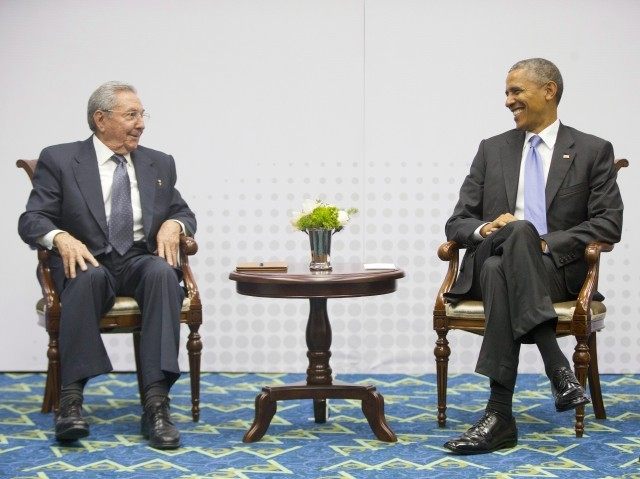Multiple reports citing senior administration officials are confirming the news that the United States and Cuba will announce the opening of embassies in Havana and Washington, D.C., respectively. Cuban officials have confirmed that a letter to dictator Raúl Castro announcing the opening of the U.S. embassy has been received.
The move follows months of unilateral diplomacy on the part of President Barack Obama, who announced in December a series of initiatives that Castro declared would help the island’s elite maintain a “prosperous and sustainable socialism.” In exchange for approval from the Castro regime, President Obama released three Cuban spies responsible for the murder of American citizens and removed Cuba from the State Department’s State Sponsors of Terrorism list, despite Havana harboring most of the leadership of the Revolutionary Armed Forces of Colombia (FARC), the world’s wealthiest non-jihadist terror group.
Now, officials note that the White House has scheduled remarks by President Obama around 11 AM Wednesday, followed by a speech by Secretary of State John Kerry, currently in Vienna negotiating a conciliatory deal with Iran on their nuclear weapons program. A parallel announcement on the part of the Cuban government is expected on Wednesday morning, as well. It is not expected that President Obama’s announcement will be broadcast in Cuba, as the communist nation does not recognize freedom of expression or media, and during past announcements regarding Cuba has instead broadcast speeches by Raúl Castro.
The Cuban foreign ministry has confirmed that Jeffrey DeLaurentis, chief of the U.S. interests section in Havana, has delivered a letter announcing the opening of the new embassy to his Cuban counterpart, even posting a photo of the event on Twitter.
The embassy, the Wall Street Journal reports, is expected to re-open in July, and Secretary of State Kerry is expected to make the trip to Havana to attend the ceremony. The United States cannot open the embassy without Congressional notification; Congress gets 15 days to review a letter announcing the opening of the embassy before such a move can formally occur.
According to the State Department’s 2014 Global Human Rights Report, the Cuban government has not made any reforms indicating that it is moving toward creating a freer society. The State Department cites the communist government for banning any public assembly of a political nature and most political expression that does not profusely praise the communist regime, as well as the long-standing practice of imprisoning Cuban nationals for pro-freedom political beliefs, and the use of isolation wards to lock political prisoners in with mentally ill prisoners as a form of psychological torture.
Most recently, following remarks by Archbishop of Havana Jaime Ortega that Cuba no longer keeps prisoners of conscience, a statement for which no evidence as surfaced, at least one Catholic church banned the families of political prisoners— women known as the Ladies in White for making a vow to wear only that color while their loved ones are in prison– from attending Sunday Mass.
Supporters of a free Cuba have strongly condemned the move to further bilateral relations with the regime, arguing that a new embassy would serve only to legitimize the Castro dictatorship further. The embassy “will do nothing to help the Cuban people and is just another trivial attempt for President Obama to go legacy shopping,” said Florida Congresswoman Ileana Ros-Lehtinen of the announcement. Senator Marco Rubio, who is also running for president, said in a statement that he would oppose the confirmation of any ambassador to Cuba, calling for “our unilateral concessions to this odious regime to end” and noting that the United States has not received any concessions on human rights from the Castro dictatorship.
Another expert, executive director of the Center for a Free Cuba Frank Calzón, told the Spanish newspaper Diario de Cuba that such an embassy reopening would “include important concessions to Gen. Raúl Castro that would be hardly be accepted by any American administrations in the future,” including “payment to the Cuban government for services within the American mission by hundreds of Cuban employees that report directly to Castro intelligence services.”
As per a new law passed by the Castro regime following President Obama’s December speech, Cubans working in the embassy– and for any foreign corporation– would only be able to keep 8% of their salaries; the Cuban government pockets the other 92%.

COMMENTS
Please let us know if you're having issues with commenting.